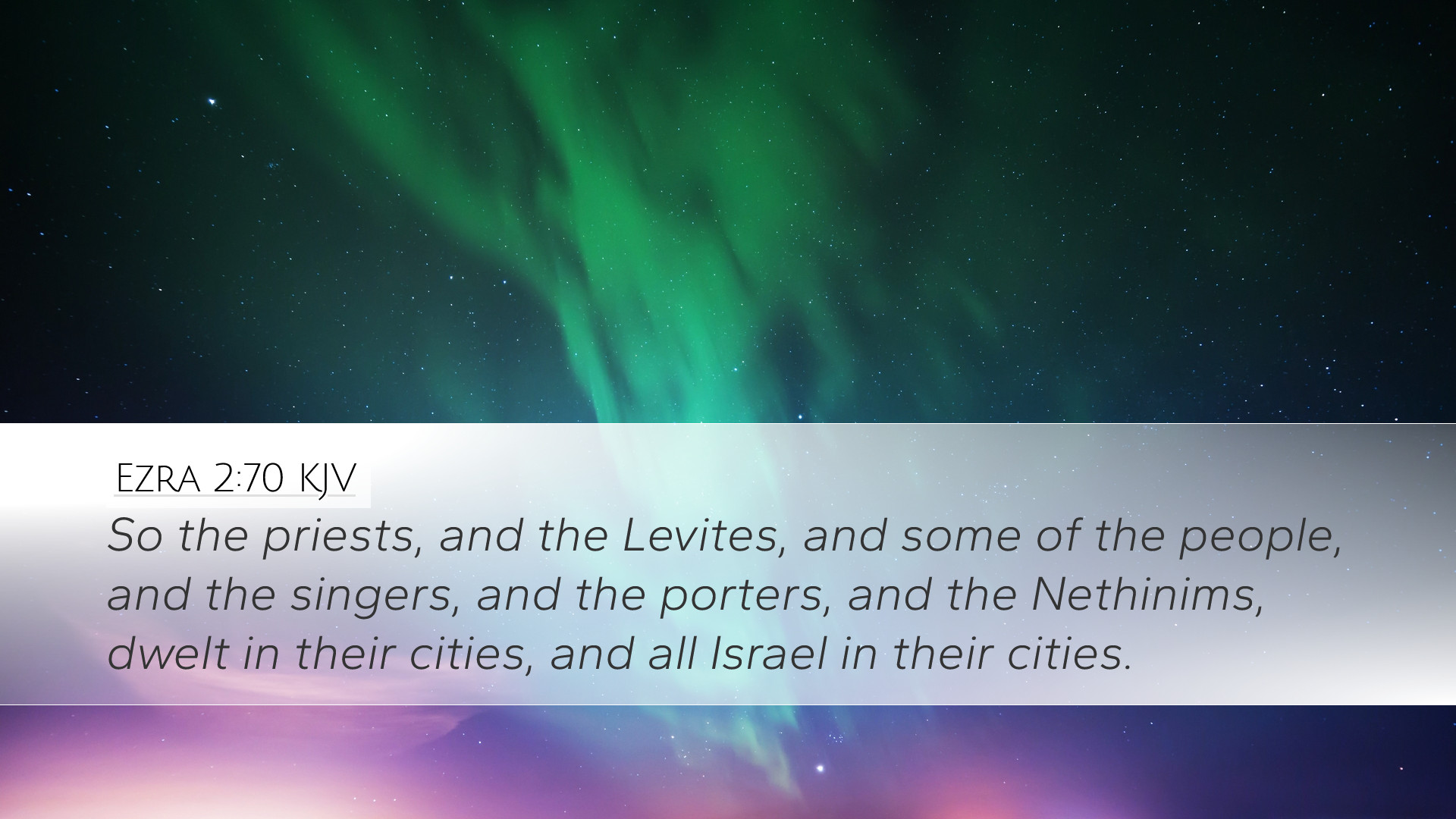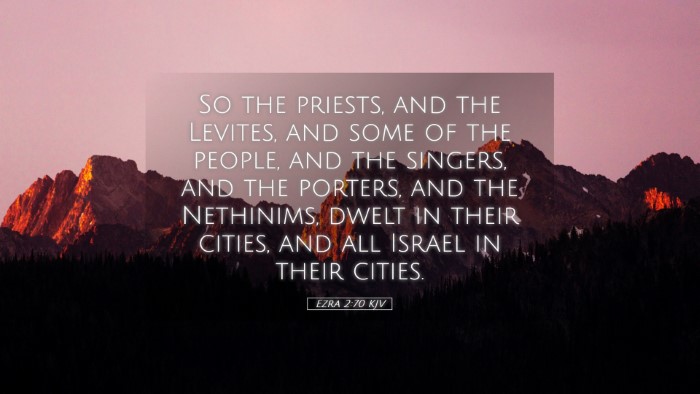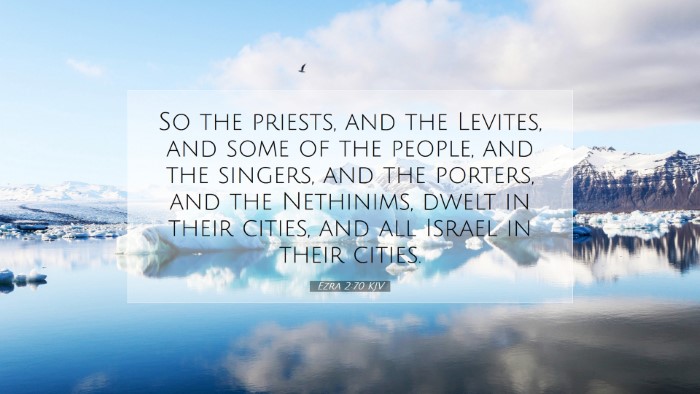Commentary on Ezra 2:70
Verse Reference: Ezra 2:70 - "And the priests and the Levites, and some of the people, dwelt at Jerusalem: and the singers, and the porters, and the Nethinims dwelt in their cities, and all Israel in their cities."
Introduction
This verse captures a critical moment in the history of Israel as they return from Babylonian captivity and begin to establish their community in Jerusalem. Insights from various public domain commentaries reveal deeper theological, historical, and pastoral implications essential for understanding this important passage.
Historical Context
The return of the Israelites after the Babylonian exile marks a new chapter in Israel's national life. Ezra, a scribe and priest, plays a pivotal role in leading this return, and his efforts reflect God's faithfulness to His covenant promises. As the exiles returned, rebuilding Jerusalem and reinstating worship practices became paramount. Commentators highlight that this was more than a mere geographical relocation; it symbolized a restoration of identity and community.
Matthew Henry's Insights
Matthew Henry emphasizes the importance of the various groups mentioned in the verse. The priests and Levites are noted for their role in maintaining the spiritual governance of the people. Henry points out that the presence of the singers and porters indicates a restoration of worship practices, denoting that the community is re-establishing its relationship with God. He reflects on the significance of each group's role in supporting the communal worship life in Jerusalem.
Albert Barnes' Perspective
Albert Barnes illustrates the societal structure that emerged after the return. He explains that the division of responsibilities among the different groups indicates an organized society ready to support the renewed worship of God. His commentary connects the involvement of the Nethinims (temple servants) as essential for the functioning of the religious and communal life, suggesting that every role, however humble, contributes to the greater glory of God.
Adam Clarke's Analysis
Adam Clarke provides a more detailed look at the implications of this gathering in Jerusalem. He notes that the specifics of the "singers" and "porters" not only reflect a revival of worship but also emphasize the return of joy and singing to the people of Israel. Clarke describes the Nethinims as a reminder of God's provision, highlighting that God designates individuals for specific purposes, reinforcing the idea of divine orchestration in community rebuilding.
Theological Implications
Ezra 2:70 communicates several key theological ideas that are crucial for pastors and scholars alike. These include the themes of restoration, communal identity, the role of worship, and the faithfulness of God.
- Restoration: The physical return to Jerusalem signifies a deeper spiritual restoration. The leaders recognized the necessity of reinstating worship practices intertwined with their cultural identity.
- Community Identity: Each group mentioned in the verse plays a critical role in establishing a new identity for Israel as they return to their homeland. The fragmented community finds unity in their shared worship and responsibilities.
- Role of Worship: The presence of singers denotes the integral role of music and praise in spiritual life. This underscores the importance of worship as a communal endeavor.
- Faithfulness of God: The gathering is a testament to God's irrevocable promise to His people. The return from exile represents God's fidelity and the fulfilment of prophecy.
Practical Applications
For pastors and theologians, the verse serves as a foundation for exploring the nature of community and worship in contemporary settings. The passage invites reflection on how modern believers can cultivate a thriving spiritual community, embracing the diverse gifts and roles each member brings.
- Encouragement of Participation: Encouraging everyone in the community to engage takes inspiration from Ezra 2:70. Every role, whether prominent or behind the scenes, contributes to the church's overall health and vibrancy.
- Reestablishing Worship Practices: Just as the returning exiles reinstated their worship, today's church must prioritize worship in its various forms—music, prayer, teaching—centering their lives around God.
- Community Unity: The verse emphasizes the importance of unity in diversity. A church's strength lies in its ability to celebrate various roles while achieving a shared mission.
- Faithfulness and Hope: Finally, the passage reassures believers of God's unwavering faithfulness. This can fill congregations with hope, especially during literal and metaphorical exiles in their journeys.
Conclusion
Ezra 2:70 encapsulates a moment of divine orchestration in the lives of the returning exiles, emphasizing the significance of worship, community, and God's faithfulness. The insights from Matthew Henry, Albert Barnes, and Adam Clarke reveal the depth of meaning within this verse, serving as a reminder of how the past informs the present as we continue to navigate our own journeys of faith. For pastors, students, and theologians, this verse acts as a basis for exploring the path of restoration in both individual and communal contexts.


